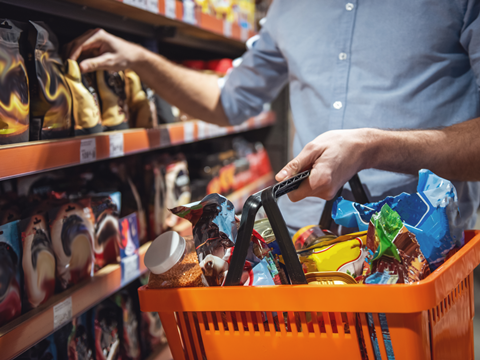
Foundation Earth and EIT Food have formed the International Alliance for Food Impact Data, which intends to set international standards for the environmental scoring of food and drinks and display the information on a product’s front label.
Launched in 2021, Foundation Earth sought to develop a system to label food and drink products with an environmental score. Now it has been integrated into EIT Food, which is in turn supported by the European Institute of Innovation and Technology (EIT), a body of the European Union; this integration is expected to inform the development of internationally recognized standards regarding the use of data to assess the environmental impact of food.
Currently, there are a range of different labels and methodologies used to communicate a product’s effects on the environment, as EIT Food explains. With each adhering to a different set of standards, they are said to be incomparable to one another – meaning that policymakers, companies, and consumers alike cannot gauge whether a product is beneficial or harmful to the planet.
EIT Food adds that “there has also been a lack of coordination across the EU and no management by an EU-level organization, a requisite recently set out by the EU Green Claims Directive.” Addressing the “complex challenge” of environmental data, scoring, and governance is important to helping the food industry achieve its net-zero commitments, it says.
The International Alliance for Food Impact Data is set to establish a single set of consistent international standards to score food based on its environmental performance. It plans to consult developing EU policy to do so, with the information set to be displayed on a product’s front-of-pack label.
“Environmental data is a key lever of change for food systems transformation,” says Richard Zaltzman, chief executive officer at EIT Food. “We are absolutely delighted to integrate the knowledge and capacity of Foundation Earth into EIT Food, which will enable us to take strides towards our shared mission of transforming the food system with credibly collected, measured and evaluated impact data.
“This will form the basis for decision-making across the food and drink industry, policy, future proofing innovation in our sector and enabling us to reduce the environmental impact of the entire food system.
“EIT Food has been working closely with Foundation Earth since its inception and we are excited to accelerate the impact we can have across the continent by building a fresh Alliance that delivers clear standards and addresses confusion that is currently hampering the environmental scoring of food and drink.”
Jago Pearson, outgoing chairman of Foundation Earth, continues: “Over the last three years, Foundation Earth has led the European-wide drive towards the environmental scoring of food and drink products. Our work now provides the building blocks for providing consumers with the information they need to make more environmentally-friendly buying choices and food producers with the credible information they need to innovate in a more sustainable way.
“EIT Food will inherit a sound body of scientific work, a coalition of the leading political, industry and scientific figures in the field and a network of leading technology partners who stand ready to accelerate Foundation Earth’s founding mission.”
Cliona Howie, the upcoming director of Data Impact System at EIT Foods, concludes: “Joining forces with EIT Food will foster wider collaboration across all those fragmented initiatives that are individually working on the environmental footprinting of food and drink products. Those efforts are currently constrained by limited resources, which has slowed progress towards a single European-wide system.
“This new Alliance will help put an end to unnecessary competition and enable us to leverage a new platform to convene a real solution with a clear roadmap, in the public service. Our focus will be on driving large-scale impact that works across the whole food system and transforming the environmental credentials of the continent’s food and drink industry.”
Back in May, various signatories – including the European Organisation for Packaging and the Environment (EUROPEN), the Alliance for Beverage Cartons and the Environment (ACE), and the Confederation of European Paper Industries (CEPI) – advocated for a “simplified procedure” for the verification of environmental claims based on recognized methodologies, as well as those that do not require a full life cycle assessment. This would theoretically apply to certification and labelling schemes and voluntary claims made by sellers.
GS1 has also reported that inconsistencies in allergen labelling on food packaging have led 20% of consumers with allergies to risk their health and safety by eating products that come with ‘may contain’ warnings. The company raises next-generation barcodes as the solution, with real-time updates set to keep allergen information accurate and accessible at all times.
If you liked this story, you might also enjoy:
How are the top brands progressing on packaging sustainability?
Sustainable Innovation Report 2024: Current trends and future priorities
Reuse vs. single use – which is better for the environment?
The ultimate guide to global plastic sustainability regulation













No comments yet